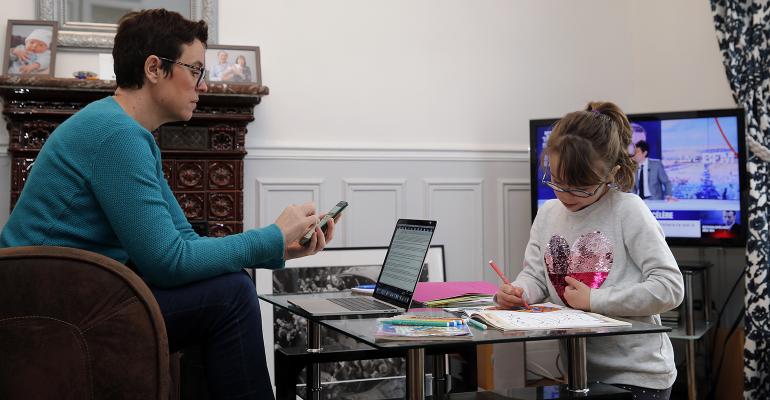For many wealth management professionals, working from home has gone from one option for connecting with clients and partners to the option, as the novel coronavirus pandemic has caused closures, cancelations and postponements across the industry. Videoconferencing and virtual finance have seen explosive growth as financial advisors are forced to consider a workplace other than the office, some for the first time.
It’s not just advisors and clients who are reconsidering the concept of a workplace. CEOs are contending with what it means to work remotely and reevaluating the value of a physical location where workers gather to carry out their responsibilities on a daily basis. After all, beyond human capital, real estate can be among an advisory firm's top expenses.
Although Summit Financial is located in Parsippany, N.J., the firm’s CEO, Stan Gregor, is hunkered down and working remotely in North Carolina. From a business continuity standpoint, at least, “there’s nothing different today than when we were sitting in the office,” he said.
The tech stack he oversees at the $3 billion AUM firm, including a portfolio stress-testing system incorporating elements of Addepar, HiddenLevers and eMoney, was working well, he said. The firm’s proprietary rebalancing software was performing without outages and he had not heard of any instances where the custodian software used by the 65 teams of advisors at the firm was encountering problems.
But while Summit Financial has found it can work just fine without a physical location, Gregor isn’t about to throw in the towel on office space. “There is a need for a nucleus of corporate resources to be somewhere,” he said. “You can’t have everyone working remotely. The people who support advisors need to be in a place where you know they’re at and you can reach them.”
As a business leader during the Sept. 11, 2001, terrorist attacks, Gregor saw the importance of operational redundancies, as well as their limitations. The company he worked for had backup servers in several different towers of the World Trade Center’s complex. The attack showed that the physical breadth of backup operations was important, he said. “We figured that [installing servers] in different buildings, we would have been protected. But that’s a great example of a mistake we have never made again.”
Grouping operations around specialties, such as investment management or insurance, as well as dispersing them across the country, helps ensure continuity if one or several locations experience disruptions, he added. Following the pandemic, companies may not abandon office space altogether, "but many are going to be thinking about, 'Do I keep all of my employees in one location?'” he explained.
Some so-called virtual advisors, however, take a different view. For them, the pandemic is exposing the futility of anything but a remote experience. “Clients are thinking, ‘Hey this is really convenient,’” said Michael Caligiuri, a financial planner at Caligiuri Financial in Columbus, Ohio. “Everybody’s been able to meet now, because they’re forced to work from home.”
The remote nature of work during the pandemic is only accelerating a trend already in motion, he added. The firms just now experiencing remote advising are behind the times. “These old firms aren’t leading by asking the client if they prefer virtual or in-person meetings,” he said. “They’re just saying, ‘Let’s meet in person.’ Married people with kids, they just don’t have the time.”
“If your argument [for in-person meetings] is clients need to see your lower body when you’re presenting, maybe you have a point,” he added sarcastically.
Just this month he’s already brought in new clients, he said, adding to the $7 million in AUM at his firm.
One of the aspects missing from remote working is the social nature of an office. Alternative investment marketplace iCapital Network holds a virtual happy hour every Friday, in an effort to recreate the cohesion missing when the New York City-based firm switched to working remotely, said CEO Lawrence Calcano. Workers on Zoom videoconferencing calls are encouraged to turn on their webcams and make the visual, not just verbal, connection with their colleagues, he said.
The switch from in-office to off-site working does have Calcano thinking differently about office life after the pandemic, however. "We’ll continue to be largely a company that interacts together" in the same physical space, he said, but "on an ongoing basis, having people rotate and work remotely is probably something we’ll implement as a company.”
For workers with pets crawling over their keyboards or those trying to record a podcast with kids crying the background, the office has taken on a new allure. It’s also nice to have the connectedness of being in the same place as co-workers, said Clara Shih, CEO of communications-focused fintech firm Hearsay Systems.
“It’s kind of ironic, to come from a tech person,” she said.
As a leader, the new ideas and first-hand sense for who is working on what projects doesn’t come through in a remote environment, she said. It’s a “mental tax” to set up video calls for the flurry of conversations and decision-making processes that need to take place. “Before we could just walk the halls,” she explained.
“We miss being together,” she said of her and her employees. “After this, a lot of us are looking forward to being together.”





